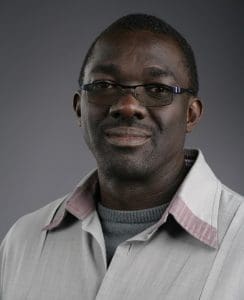“The more you know, the more you are able to change your community.” Member Spotlight: Colins Imoh
 Colins Edozie Imoh is a Nigeria-based consultant with MBB and has contributed to projects in Nigeria, Kenya, Benin, Guyana, Sierra Leone and other parts of the world. Outside of MBB, he was a consultant at Friedrich-Ebert-Stiftung (FES) Nigeria. He designed a training manual and program for Open Minds, Young Voices – Youth Activists Programme of FES Nigeria. He was the pioneer Project manager for the PIND / Chevron project Partners for Peace program in the Niger Delta. He also served as advocacy consultant for the Search for Common Ground’s “Tomorrow is a New Day,” a project that supports stability in the Niger Delta region by promoting a culture of nonviolence. Recently, he completed a training manual on gender-sensitive early warning for an EU, UNWOMEN, IPCR, UNICEF, WANEP project in Northern Nigeria. Colins’ deep motivation to serve the people of Nigeria inspired him to embark on the journey of formal peacebuilding work.
Colins Edozie Imoh is a Nigeria-based consultant with MBB and has contributed to projects in Nigeria, Kenya, Benin, Guyana, Sierra Leone and other parts of the world. Outside of MBB, he was a consultant at Friedrich-Ebert-Stiftung (FES) Nigeria. He designed a training manual and program for Open Minds, Young Voices – Youth Activists Programme of FES Nigeria. He was the pioneer Project manager for the PIND / Chevron project Partners for Peace program in the Niger Delta. He also served as advocacy consultant for the Search for Common Ground’s “Tomorrow is a New Day,” a project that supports stability in the Niger Delta region by promoting a culture of nonviolence. Recently, he completed a training manual on gender-sensitive early warning for an EU, UNWOMEN, IPCR, UNICEF, WANEP project in Northern Nigeria. Colins’ deep motivation to serve the people of Nigeria inspired him to embark on the journey of formal peacebuilding work.
Colins grew up in Nigeria and observed the complicated effects of the oil industry on the local communities. While there were oil jobs for some, poverty and marginalization were, and still are, rampant. As an engineer within the oil industry, Colins saw the extreme poverty firsthand. For instance, just a few miles from the comfortable and modernized facilities for company workers, there were communities lacking electricity, clean water, and access to work.
Colins immediately became a community activist and a youth leader. He was soon invited to Cape Town for a summit of African youth activists. There, he received the invitation to work for the United Nations for Youth in the Netherlands as the Africa Desk Coordinator. He left behind his short-lived career as an engineer and became a full-time peacebuilder, working in the UNOY office in the Netherlands. “There’s more joy in helping communities work for peace,” he succinctly put it.
Colins notes that at all these key junctures of his life’s journey, it was his commitment to remain open to new experiences and his desire to learn as much as possible that propelled him forward. “The more you know, the more you are able to change your community.” Colins has traveled and supported, connected, and empowered youth across Africa in their community development efforts.
His work revolves around the concept of conflict transformation, a dynamic and holistic approach that focuses on addressing the roots of conflict, thereby, strengthening and healing relationships within the community. Traditional conflict management techniques play a role in this, but deeper work is required to transform Nigeria, a country plagued by endemic violence, poverty, and environmental degradation. At the root is the government’s inability to intervene positively in the daily lives of its citizens. Colins centers his efforts on citizen empowerment and education. As part of the Center for Human Development and Social Transformation, he promotes citizen dialogue about peace and good governance. He coordinated and facilitated a weekly radio show that ran continuously for 6 years. Capacity-building and grassroots work to educate citizens about the rule of law and the democratic process creates the foundation for a stable and peaceful society.
It’s not easy to keep people’s spirits up in the face of the violence endemic in parts of Nigeria. Colins does not see violence as part of human nature, but as a response to circumstances. “People feel helpless, which leads to desperation and violence. If we see it from this perspective, the blame stops.
One of the primary obstacles Colins faces in his work is convincing people that peace is the best option for immediate survival and ongoing community development. “The issue is that people in power dominate people without power: the people who are dominated look to violence as a form of leverage.”
A second obstacle is finding reliable and ongoing sources of funding. The priorities of aid organizations can change and suddenly resources evaporate.
Colins continues to work with African youths, exhorting them to see themselves as architects of the future of their communities and countries. His advice to all young peacebuilders: above all else, strive for openness.
Be open: “Each time one encounters a new experience, the openness with which one imbibes that experience affects how one sees the world. As we journey through life, being open helps us to see the world through a different lens. Our openness to see things from the other person’s perspective changes us and affects the work we do.”
Start with Yourself: “First of all, peacebuilding is an opportunity to change ourselves. We have to start with ourselves.”
Don’t take yourself so seriously: “If we can let go of ourselves and our egos just a little bit, we will appreciate people more and we can make the world a better place.”
Don’t be neutral: “As mediators, our role is to be neutral, but we can’t be neutral in the face of injustice because we want peace.”
Article by Byron Wild, MBBI Writer
